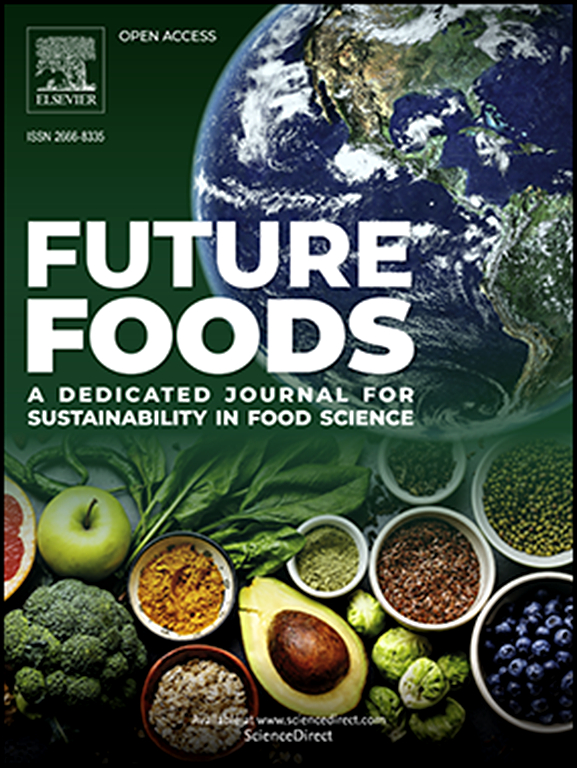Fabrication and study on alginate-based biodegradable active film incorporated with cuminaldehyde and Zataria multiflora extract liposomes
IF 8.2
Q1 FOOD SCIENCE & TECHNOLOGY
引用次数: 0
Abstract
The demand for sustainable food packaging has driven research into biodegradable films with improved functional properties. However, limitations such as poor mechanical strength, high water permeability, and low antioxidant and antibacterial activity restrict their application. This study addresses these issues by developing alginate-based films incorporating Zataria multiflora extract (ZmE) and cuminaldehyde encapsulated in liposomes. The moisture content of films ranged from 7.9 % to 8.37 % with non-significant differences. Thickness and density of films with encapsulated ZmE and cuminaldehyde were 135 μm and 1.35 g/cm-3, respectively, comparable to the control. Free-form ZmE and cuminaldehyde caused non-uniformity in the film matrix, whereas encapsulation improved structural homogeneity. Liposomal ZmE and cuminaldehyde increased tensile strength (TS) (5.95 MPa) and elongation at break (EAB) (37.08 %) while reducing water vapor permeability (WVP). Lightness (L*), whiteness index (WI), and color difference (ΔE) were affected without changes in opacity. Attenuated Total Reflectance-Fourier Transform Infrared (ATR-FTIR) analysis indicated weak biopolymer-additive interactions. Radical scavenging activity (RSA) in liposomal films remained high (75.72 %) after 30 days. Liposome incorporation also enhanced antibacterial activity, particularly against Gram-positive bacteria. These findings suggest that liposomal encapsulation improves the physical, mechanical, and functional properties of alginate films, making them a promising material for active food packaging applications.

海藻酸盐基孜然醛-百扎草提取物脂质体生物降解活性膜的制备与研究
对可持续食品包装的需求推动了对具有改进功能特性的可生物降解薄膜的研究。然而,机械强度差、透水性高、抗氧化和抗菌活性低等限制了其应用。本研究通过开发海藻酸盐为基础的薄膜来解决这些问题,该薄膜将扎扎草提取物(ZmE)和孜然醛包裹在脂质体中。膜的含水率在7.9% ~ 8.37%之间,差异不显著。ZmE包封膜厚度为135 μm,孜然醛包封膜密度为1.35 g/cm-3,与对照相当。自由形态的ZmE和孜然醛导致薄膜基体的不均匀性,而包封改善了结构的均匀性。脂质体ZmE和cuminaldehyde增加了拉伸强度(TS) (5.95 MPa)和断裂伸长率(EAB)(37.08%),同时降低了水蒸气渗透性(WVP)。影响亮度(L*)、白度指数(WI)、色差(ΔE),不透明度不变。衰减全反射-傅里叶变换红外(ATR-FTIR)分析表明生物聚合物-添加剂相互作用弱。30天后,脂质体膜的自由基清除活性(RSA)仍然很高(75.72%)。脂质体掺入也增强了抗菌活性,特别是对革兰氏阳性细菌。这些发现表明,脂质体包封改善了藻酸盐薄膜的物理、机械和功能特性,使其成为一种很有前景的活性食品包装材料。
本文章由计算机程序翻译,如有差异,请以英文原文为准。
求助全文
约1分钟内获得全文
求助全文
来源期刊

Future Foods
Agricultural and Biological Sciences-Food Science
CiteScore
8.60
自引率
0.00%
发文量
97
审稿时长
15 weeks
期刊介绍:
Future Foods is a specialized journal that is dedicated to tackling the challenges posed by climate change and the need for sustainability in the realm of food production. The journal recognizes the imperative to transform current food manufacturing and consumption practices to meet the dietary needs of a burgeoning global population while simultaneously curbing environmental degradation.
The mission of Future Foods is to disseminate research that aligns with the goal of fostering the development of innovative technologies and alternative food sources to establish more sustainable food systems. The journal is committed to publishing high-quality, peer-reviewed articles that contribute to the advancement of sustainable food practices.
Abstracting and indexing:
Scopus
Directory of Open Access Journals (DOAJ)
Emerging Sources Citation Index (ESCI)
SCImago Journal Rank (SJR)
SNIP
 求助内容:
求助内容: 应助结果提醒方式:
应助结果提醒方式:


